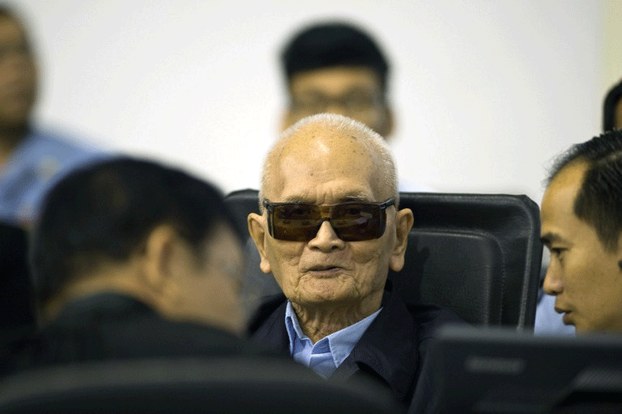




Updated at 4.35 p.m. ET on 2014-08-07
A U.N.-backed war crimes tribunal on Thursday found two top leaders of Cambodia's notorious Khmer Rouge regime guilty of crimes against humanity and sentenced them to life imprisonment in a verdict hailed by human rights groups and some of the surviving victims.
The sentences against octogenarians Nuon Chea, right-hand man to the group's late leader, Pol Pot, and former head of state Khieu Samphan were the first against the top brass of the regime accused of killing nearly two million people during a reign of terror about four decades ago.
Judge Nil Nonn said the duo, the most senior surviving Khmer Rouge leaders, were "guilty of the crimes against humanity" of murder and extermination, political persecution, and other "inhumane acts."
Their lawyers said Nuon Chea, 88, and Khieu Samphan, 83, would file an appeal but the court had earlier ruled that they would remain in jail until any final judgment is made due to "the gravity of the crimes" during the "Killing Fields" era from 1975-1979.
“The punishment is not appropriate for what he did," Khieu Samphan’s lawyer Kong Sam Onn said. "I will appeal the verdict.”
In frail health, the two men showed no visible reaction when the judge announced the verdict. They had denied wrongdoing in their defense.
Nuon Chea, known as "Brother Number Two" for being Pol Pot's trusted deputy, and Khieu Samphan, one of the few public faces of the brutal regime, now face a second trial that is due to start in September or October on charges of genocide.
Pol Pot died in 1998 and only one Khmer Rouge senior official—former prison chief Duch—has been convicted and jailed for crimes committed by the regime.
Probe since 2006
Officially called the Extraordinary Chambers in the Courts of Cambodia (ECCC), the U.N. tribunal launched its probe on the Khmer Rouge atrocities in 2006 and spent more than U.S. $200 million for its work that included both Cambodian and foreign experts as jurists, prosecutors and defense lawyers.
Prime Minister Hun Sen, a former Khmer Rouge soldier, has voiced his disdain for the court and discouraged further cases, warning that further prosecutions could upset reconciliation with ex-guerrillas and trigger conflict.
Deputy Prime Minister Sok An, who attended the hearing, said in a joint statement with the U.N. Assistant Secretary General for Legal Affairs Stephen Mathias that the ruling was a "milestone in the work of the ECCC and a historic moment in international criminal justice."
Regime victims welcome verdict
Survivors of the brutal regime and children of those who perished at that time welcomed the verdict but said other senior officials who served under the regime should also be punished.
They also called for compensation for the victims.
“The verdict is acceptable,” said Bou Meng, who was among those who managed to flee the Khmer Rouge prison camp in Phnom Penh, code-named S21, where more than 12,000 men, women and children were tortured, executed, and dumped in mass graves.
“There must be compensation based on their guilt. I can’t accept when there is no compensation,” he said.
Another victim, Soun Vann Thorn, said he could not accept the verdict totally because the Khmer Rouge leaders were too old to undergo the misery of a life imprisonment.
“I can’t accept the verdict 100 percent," he said, asking the tribunal to also push ahead with "cases 003 and 004" aimed not at the Khmer Rouge's very top leadership but at five other leaders also most responsible for serious crimes during the reign of terror.
“There are many former Khmer Rouge officials who are still alive and have failed to testify,” he said.
A former Khmer Rouge soldier, who refused to be named, said he still believed the Khmer Rouge leaders were innocent.
“I don’t see any mistakes they made,” he said. “As a soldier, we didn’t know about the killings.”
The Cambodian Human Rights Action Committee (CHRAC), a coalition of 21 NGOs working in the fields of human rights, democracy and the rule of law, said it "applauds" the verdict and judgment.
"The ECCC and the international community send a clear signal that persons responsible for the commission of mass atrocity crimes will eventually be brought to justice," it said in a joint statement.
Reparation
The CHRAC also said it remained concerned that there was no financial capacity in the ECCC to support most of the reparation projects for victims of the Khmer Rouge.
The tribunal decided to endorse 11 reparation projects for victims and called for them to be fully implemented.
The CHRAC said that "lack of funding remains a serious concern as NGO partners proceed to plan and design reparation projects to submit" to the tribunal for the upcoming genocide case.
Global rights group Amnesty International’s Deputy Asia-Pacific Director Rupert Abbott said the long-awaited ECCC ruling was an important step towards justice for the victims of the Khmer Rouge period and highlighted "the importance of addressing impunity.”
He said that an earlier refusal of senior Cambodian government officials to give evidence, as well as allegations of political interference in other ECCC cases, was troubling and raised concerns around the fairness of the proceedings and respect for victims’ right to hear the full truth regarding the alleged crimes.
“Fair and effective trials are crucial if the ECCC is to leave a lasting legacy which strengthens Cambodia’s very fragile judicial system and contributes towards ending the deep culture of impunity.
“The ECCC must complete all of its cases in a timely and fair manner without political interference. This will require the full support of the Cambodian government and the international community.”
Reported by RFA's Khmer Service. Translated by Samean Yun. Written in English by Parameswaran Ponnudurai.